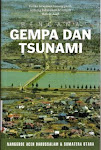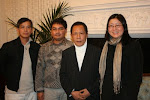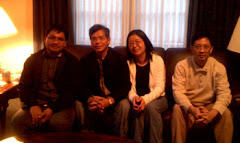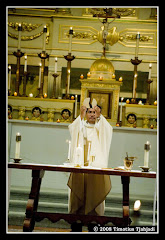Tuus Sum Ego:
Karl Rahner’s Theology of Freedom
By Patrisius M. Andalas
Man actually exists only when says “God,”
even only as a question answered in a negative.
Karl Rahner[1]
Theology of freedom discusses the mystical dialogue between humans and God. It recognizes a human being as a person of freedom and Christian God as a God of freedom. It emphasizes that humans come near to God as free persons and that God approaches humans as free persons. God directs and orients human freedom to God. Human freedom reaches its finality when it surrenders to God. It moves from and toward God. Prayer becomes a fundamental option of a free person who surrenders his or her life to God. Karl Rahner re-defines prayer as a mystical dialogue between humans and God. Prayer becomes difficult act for contemporary people because they reject the divine grace that orients their freedom to God. An authentic prayer, however, traces a mystical journey to God that enables humans to say courageously, “Tuus sum Ego.”[2]
Karl Rahner, one of the greatest systematic theologians in the 20th century, discusses the theology of freedom brilliantly both in his theological essays and in his prayers. This essay attempts to explore his theology of freedom in his writings. I assume that his theological essays and prayers do not contradict against each other in discussing theology of freedom. I also assume that his Encounters with Silence does not merely translate his theological essays in the form of prayer. I anticipate that his personal prayers may deepen his theological essay on freedom. I use his book on prayer, entitled Encounters with Silence, to start the discussion. His theological essays on freedom can easily create the impression that he regards freedom as an abstract issue. I invite readers to see Rahner as a poet of God who re-imagines prayer as a mystical dialogue with God based on his theology of freedom.
To help readers follow my theological journey with Karl Rahner, I first portray Karl Rahner as a poet of God who re-defines prayer as a mystical dialogue with God by demythologizing it. I do so in a close reading of Encounters with Silence in which I focus on freedom. I investigate three important questions that guide us to understand his theology of freedom. How does Rahner re-imagine himself? How does he re-imagine God? How does he encounter and communicate with God? After discussing his book of prayers, I develop further his idea of freedom from his theological essays. Finally, I will highlight some key ideas in his theology of freedom which might help the theological community to discuss further his theology of freedom while helping contemporary Christians to deepen their prayer life.
Karl Rahner as a Poet
Many people recognize Karl Rahner as one of the great Christian systematic theologians in the 20th century. I guess only few people consider Rahner as a poet of God. I begin to consider Rahner as a poet of God when I read Encounters with Silence. Many people may regard his daily prayers as less poetic or even un-poetic than I. Rahner never calls himself as a poet of God. His prayers, however, in my opinion, have a poetical dimension in the basic sense that they evoke the mystery of God. Rahner describes a poet as one who evokes the mystery of word by incarnating it.[3]
Although he himself never claims expertise in linguistics, Karl Rahner believes that words provide a key to existence. Rahner distinguishes words into a “primordial word” and a “fabricated word.” A primordial word deals with mystery, while the fabricated word does not deal with mystery. The primordial word evokes the mystery of things, while the fabricated word seeks mastery over things.[4] Rahner admits the impossibility to define the primordial word. He talks about it analogically
The primordial words always remain like the brightly lit house which one must leave behind, ‘even when it is night’. They are always as though filled with the soft music of infinity. No matter what it is they speak of, they always whisper something about everything. If one tries to pace out their boundary, one always becomes lost in the infinite. They are the children of God, who possess something of the luminous darkness of their Father. [5]
The primordial word presents the thing itself.[6] Karl Rahner considers poets (Dichter) as capable of speaking primordial words in powerful concentration (verdichtet).[7] They have power to present reality through their words. Rahner sees the primordial word as the primordial sacrament of all realities. He regards poets as the ministers of the words.[8] Rahner discusses the new relation between poet and religious leaders who use words to speak about God.
What is a priest? May we not then describe the priest as the man to whom the word has been entrusted? Is he not quite simply the minister of the word? The word which is entrusted to the priest as gift and mission is the efficacious word of God himself.[9]
The priest speaks about the word of God as the incarnation of the eternal Logos of God. The word of God becomes the word of man because God comes in human words.[10] The word, as the primordial sacrament of transcendence, is capable of becoming the primordial sacrament of conscious presence in the world of the God. This world ranks inferior to the world of God. God has come in grace and in the word. Without grace, God-self’s communication, words would become empty. Without word, grace would not affect us as spiritual and free persons in a conscious way. The word embodies the divine grace.[11]
Karl Rahner realizes that we can only speak about God incompletely. Yet Rahner encourages us to speak about God courageously since God entrusts a multitude of words to us.[12] Theologian- poet of God receives the word of God as an efficacious word entrusted to him. Every other word only explains and echoes this one word. Entrusted in such a way with the primordial word of God in the world, the theologian priest can speak the word in its absolute concentrated power.[13] Rahner also treats certain terms such as “human being,” “freedom,” “love” “sin,” and “grace” as words that do not contain a clearly definable meaning. These words remain important because they relate to our life.
Prayer as a Mystical Dialogue with God
Karl Rahner speaks as a realist Christian theologian who seeks to respond to the problem of contemporary people, including himself. Contemporary people often find it difficult to dialogue with God. They show an eagerness to address God, but they express their fear of turning God into an idol of their own thought. They experience God as the Mystery and often choose to keep silence about it. They experience the incomprehensible God, but many do not know how to address the Mystery. They encounter the Mystery but fail to name it. They do not want to take the risk of addressing God inappropriately. As a result, they fail to experience prayer as “the last act of speech before the silence.”
Karl Rahner encourages contemporary people to pursue their mystical journey by encountering God and naming the Mystery. Rahner envisions an open possibility to address the incomprehensible God. He invites his fellow theologians to discuss further whether the possibility of a real address to God comes from human nature or divine grace. Prayer, in its most basic sense, addresses the Mystery. Contemporary people can actually speak to God and address God in their prayer. An authentic prayer draws them near to God. It enables them to say “Thou” to God and enables God to say “I” to them.[14] It leads them to surrender themselves to God and accept the Mystery.[15]
Karl Rahner uses a popular definition of prayer as a dialogue with God, but develops it in the light of his new definition of prayer as a mystical dialogue with God. Prayer consists in dialogue between humans and God. Humans should not regard prayer as a monologue. Contemporary people often wonder whether God really communicates with them or whether they only speak a soliloquy. Their prayer can also turn into a discourse about God that uses the word of God. They enjoy the assistance of the word of God, but they can feel that they do not communicate with God. They may assume that their knowledge about God as a personal Mystery will automatically turns their prayer into a dialogue.
Karl Rahner feels empathy for contemporary people who seek to build a new relationship with God. Rahner believes that they can seek to relate with God as partners. They should remember that their relationship with God differs from their relation with human beings. Prayer requires freedom on both sides of the dialogue. Rahner challenges the skepticism of psychology and of other disciplines that deny the experience of dialogue between humans and God in prayer.[16]
Karl Rahner also understands prayer as a mystical dialogue with God when he talks about community prayer. An authentic prayer leads people to experience both love God and the fact that God loves them. It raises their mind and heart to God. It reaches out to the infinity of God. Rahner urges his contemporaries to understanding God positively when they enter as a community into union with God.
As with all prayer, prayer in common must become ingrained, it must be learned. It may not be allowed simply to be the product of a mood of the moment or of sudden improvisation. Prayer in common must be learned today anew; it must gather experience, so as to be able to overcome barriers and open closed doors, and really be the common dialogue of human beings with God, in which each person hears and says, together with others, the same word as the others dare to say to their God… But what a blessed marvel – and yet one should prepare for – if human beings, bound together in inward love, were to praise God, thank God, and weep before God together in common prayer, and thereby be enabled to experience that the one, eternal God loves each of them, altogether personally and uniquely, as a member of the holy society of all the redeemed![17]
I Come Near to God
Rahner does not define freedom clearly in his prayers. He also does not tell us how his theology of freedom influences his prayer. He rather shares his experience of petitioning God and of praying and loving the divine Mystery. He considers prayer a loving union with God. He also shows his eagerness to help contemporary people to find God in their lives. Although he does not in praying define freedom explicitly, we can track his understanding of freedom by focusing on his experience of prayer. He starts his conversation with God as an I, person of freedom, and calls God of freedom as a Thou.
I should like to speak with You, my God, and yet what else can I speak of but You?... Isn’t everything I ever say really a statement about You?
On the other hand, if I try, shyly and hesitantly, to speak to You about Yourself, You will still be hearing about me. For what could I say about You except that You are my God, the God of my beginning and end, God of my joy and my need, God of my life.[18]
Karl Rahner insists on the experience of God as Mystery although he addresses God intimately as Thou. God invites Rahner to enter into a deeper knowledge of himself and to turn from his outer life into an inner life with God. Rahner expresses his restlessness because he experiences God both intimately and distantly. Divine grace empowers him to address God because God communicates God’s self graciously by using human word. Rahner’s God calls him to become a pilgrim who thirsts for the divine Mystery. God leads him to lift his mind and heart to the Mystery and accept God by saying, “Tuus sum Ego.”
Even granting that You had revealed to me this secret of Your own inner life, would I be able to accept and realize this Mystery if Your life had not become my life through grace? Would I be able to acknowledge and love You, Father, and You, eternal Word of the Father’s Heart, and You, Spirit of the Father and the Son, if You had not deigned to become through grace the triune God of my life?
Karl Rahner understands the Christian God as a God of freedom. Rahner realizes that mere knowledge about God as a God of freedom does not suffice to enter into a mystical dialogue with God. Still, he needs He needs knowledge of God as God of freedom in order to enter into union with God. He admits that his prayers sometimes become difficult because he only knows the God of freedom as a concept. As a Catholic, he experiences God concretely through the sacraments. He experiences that God communicates with him and he invites God to dwell at the center of his life. He shares his rich experience of God by addressing God with different names.
But what am I really saying, when I call you my God, the God of my life? That You are the meaning of my life? The goal of my wanderings? The consecration of my action? The judgment of my sins? The bitterness of my bitter hours and my most secret joy? My strength, which turns my own strength into weakness? Creator, Sustainer, Pardoner, the One both far and near? Incomprehensible? God of my brethren? God of my fathers?[19]
Karl Rahner confesses that he does not yet give himself fully God. Rahner sometimes confronts God as a stranger. He can’t find God because he flies from his own true reality as person. He often treats God as a stranger whom he avoids. God expects him to approach as a true person, but his own indifference prevents him from approaching God as a free person. He needs to re-imagine God as a Person in order to enter into a mystical dialogue with the divine Mystery. His relationship with God stagnates if he does not treat God as a Thou.
To give you in prayer the only thing You want: myself. But that’s just what I am unable to do, because in the superficiality of the ordinary routine into which my life is cast, I am a stranger even to myself. And how can I seek You, O distant God, how can I give myself up to You, when I haven’t even been able as yet to find myself.[20]
Karl Rahner admits that in his dialogue with God he falls short of developed personhood. When he relates to God maturely, he considers God as the first and last word in his life. Yet he still experience prayer as a boring and monotonous duty. He easily forgets God and concentrate on other things. He does not yet fully embrace God as the Truth that sets him free. He considers himself an amateur pilgrim who journeys to God but ends his prayer with question marks.
Are You truly the Spirit of Freedom in my life, or are You not rather the God of law? Or are You both? Are you perhaps the God of freedom through law? Your laws, which You Yourself have given us, are not chains – Your commands are commands of freedom. In their austere and inexorable simplicity they set us free from our own dull narrowness, from the drag of our pitiful, cowardly concupiscence. They awaken in us the freedom of loving you.[21]
Karl Rahner acknowledges that in his courageous longing for the coming of the
May the kingdom of Your freedom come! It is the kingdom of Your Love, and it is only there that I am truly free from myself and from the will of my fellow men, because there I am not serving them, nor for their sakes, but serving You, for Your sake….In no command do I belong to men, but to You, and he who belongs to You is free. You are not God of laws because You will that we should serve law: You are rather the God of the one law, that we should give our love and service to You alone.[22]
Divine grace enables Karl Rahner to know and love God. It has a power to return him to God. Rahner believes that many contemporary people lose track of God because they reject divine grace. Rahner admits humbly that he too fails to resist the temptation to avoid God. Divine grace, however, empowers him to listen to the God who knocks their heart. It will also empower others to welcome God as a God of freedom and grace until the final day of his lives.
There is only one thing I can beg for, and that is Your most ordinary and most exalted gift, the grace of Your Love.…Touch me with this grace, O Lord. When I reach out in joy or in sorrow for the things of this world, grant that through them I may know and love You, their Maker and final home. You who are Love itself, give me the grace of love, give me Yourself, so that all my days may finally empty into the one day of Your eternal life.[23]
The Theology of Freedom
Karl Rahner explains further his new understanding of prayer in his theological essays. In the previous section, Rahner re-imagined prayer as a mystical dialogue between human being and God. His understanding of prayer can become for us a bridge to understand the theology of freedom. He addresses those contemporary people who find freedom as a mystery and therefore tend to mystify it.[24] He fears that contemporary people manipulate freedom when they seek for a greater freedom in human selfishness and sinfulness.[25] In developing his theology of freedom, he reviews a classic understanding of concupiscence and distinguishes it from an active rejection of God. Rahner considers personal freedom as a fundamental act before God. He regards sin as a fundamental rejection of God. The divine grace, on the other hand, empowers human beings to accept God by declaring courageously “Tuus sum Ego.”
Contemporary people tend to equate freedom with liberating themselves from social, economic, and political manipulation. They also recognize that they need to protect individual freedom from external manipulation. Rahner does not underemphasize the importance of personal and social freedom, and he acknowledges their manipulation. He rejects, however, the popular understanding of freedom as a mere capacity to choose between objects given a posteriori. This notion of freedom reduces God equally to an object among other objects. It also fails to express adequately the responsibility of human being as a free person.
Karl Rahner is hinting at the Augustinian distinction between freedom of choice and liberty. Rahner summarizes his theology of freedom as follows:
The reality and the notion of freedom are not merely something which belongs to the human person’s natural being, which the church, as the guardian even of the natural order, would then in addition defend and regulate in its ordered exercise and in the different fields in which such freedom is lawful. Freedom is rather a proper theological notion which expresses a reality belonging strictly to the order or grace, and much more than this psychological freedom of choice and freedom as a right of the person. Freedom is a theological notion expressing a reality which in the strictest sense of identity is itself the gift of salvation, rather than being merely a presupposition for salvation. For the real, true, and ultimate freedom, which must be gifted to our freedom is to free it from guilt, law, and death, is the sacred Spirit of God itself and of his Christ. Hence the church is the indispensable, existential place of this freedom, insofar as and because this spirit can be had only in the church, since it is her inner reality and she its external reality.[26]
Freedom toward God
Karl Rahner uses the scriptural image of dust to describe human person.[27] He uses dust as a vivid image of anonymity and indifference of human person. He rejects a Platonic understanding of human being that emphasizes the mortality of human body and the immortality of human soul. A Platonic understanding of human life only considers the existence of dust-experience in human life partly. Rahner emphasizes that we experience dust wholly as a human person. He also rejects a pessimistic understanding of human person. He never tries to say that human beings are material creatures. He also emphasizes that human beings are spiritual creatures too. He encourages us to accept honestly the existential experience of dust in our lives in order to see human beings as both material and spiritual creatures.
Christianity does not free us from the dust-experience. It also does not bypass it, but goes right through it. It continues to apply the dust-experience for contemporary Christians. Karl Rahner does not annul the dust-experience when he talks about human being as a spiritual creature. Rahner rather emphasizes the dust-experience because he stands before God as an unfathomable Mystery. He can neither understand divine way nor comprehend divine judgment. As a creature, he stands before the Mystery as a lost sinner. He admits that he often feels alone and can take refuge only in God. He struggles to find his true self because he tends to ignore it.[28]
For Rahner, Christian freedom has an irreducibly theological character. Rahner endorses St. Thomas Aquinas when the latter declares that humans can know God implicitly in every object. Rahner discovers the presence of God in every act of genuine human freedom.[29] Such an act expresses a fundamental option (optio fundamentalis) of human being as a free person to confessing “Tuus ego Sum.” Such an act relates God as the final end of human being. It denies that God functions only as a horizon supporting human freedom. It acknowledges that human beings as historico-spiritual creatures journey toward God. Rahner understands Christian freedom as freedom vis-à-vis God. He experiences that God meets with him everywhere and God so becomes the most basic question confronting his freedom.
Rahner the theologian rejects a prevailing misunderstanding of sin either only a contingent event or as constitutive element of the essence of humanity. The sin we commit does not only exist only in the past, but it corrupts our present existence. It contradicts the grace. Sin contradicts God absolutely and endangers salvation because it turns away from God. It affects our present state. Sin exists and affects our present state. Incomprehensible grace saves us from our sin.[30] Rahner speaks of sin when he writes, “It is terrifying to be alone before God without God.”[31]
Karl Rahner fears that people can overlook sin then real sins when they blandly declare themselves human and therefore capable of sin. Often people say such things because they believe that others expect them to. He challenges contemporary people to face their lives honestly. Howe have they really sinned? What dangers of real sin lurk in their lives? He fears a persistent human tendency toward self-deception by denying the real presence of sin in their life (1 John 1, 8). He also re-emphasizes the teaching of the Council of Trent (DS 1573) that “ without a special privilege from God, it is not possible to avoid all sins, even venial, for a whole life-time.”[32]
Grace consists fundamentally in God’s self-communication to enable the human being in freedom by faith, hope, and love to accept the immediacy to God that is offered to him. Since and insofar as graces makes God purely and simply the immediate goal, content, and condition of the possibility of an immediate relationship to God, grace and its free acceptance always imply a self-abandonment, a self-transcendence above all finite realities (among which the human subject of freedom itself must primarily be counted) toward the incomprehensibility of God as blessed fulfillment, attainable only “ecstatically.”[33]
Rahner believes that God becomes more real when divine grace directs and orients our hearts. It enables us to experience the nearness of God concretely. It also unites our hearts with the divine heart. It creates the possibility for an intimate encounter between the infinity of God and the nothingness of human possibility. It empowers humans to respond to the divine love by praying humbly, “Tuus ego Sum.”
Freedom as Self-Realization
Contemporary people often conceive freedom as a neutral power to do either this or that. Such a conception of freedom glorifies human capacity to accomplish, or at least to desire, whatever people want hic et nunc. It promises the possibility to revise ones acts indefinitely. It deals only with individual decisions. Interior or exterior compulsion often accounts for this or that decision. This notion of freedom fails to ask whether an act may lead to salvation or damnation. It qualifies only the human completion accidentally. Karl Rahner calls such freedom as “supposed freedom” because of its accidental character.
Genuine freedom differs from supposed freedom. It enables people to express themselves as free persons. People can decide for or against themselves. They can say either “Yes” or “No” to themselves. They take responsibility for their act before divine judgment about their acts. Such freedom of being always exemplifies a self-realization or a self-refusal of God. Genuine freedom engages final judgment whether it leads to salvation or damnation. It leads them to the finality of the subject. It becomes a whole-time project and total project of human existence.[34]
Contemporary Christians act with genuine freedom by loving God genuinely with their whole heart. They love God when they abandon themselves absolutely to God. Karl Rahner fears that all contemporary people easily create “a cult of an abstract God-idea.” Rahner recognize that contemporary Christians experience spatial, cultural, and temporal distance from Jesus. However, he denies that this distance offers the most serious obstacle for contemporary people to love God. Only the refusal to love God does that.[35] Prayer allows Christians as free persons to express their graced love of God. “Tuus sum Ego” summarizes mystical dialogue with God even for contemporary Christians.
Bibliography:
Rahner, Karl. Encounters with Silence, Translated by James M. Demske.
_____. Grace in Freedom.
_____. Hearers of the Word.
_____. Meditations on Freedom and the Spirit.
_____. Nature and Grace.
_____. The Content of Faith, eds. Karl Lehmann et. al.
_____. Theology for Renewal: Bishops, Priest, Laity.
_____. The Practice of Faith: A Handbook of Contemporary Spirituality.
_____. Theological Investigations III.
[1] Karl Rahner, “Meditation on the Word God” in Karl Rahner, Meditations on Freedom and the Spirit (New York: Seabury Press, 1967), 188.
[2] You are Mine.
[3] Karl Rahner, Theological Investigations III, “Priest and Poet” (Baltimore: Helicon Press, 1967), 294-295.
[4] Ibid., 296; Karl Rahner, Meditations on Freedom and the Spirit (New York: Seabury Press, 1978), 9 – 11.
[5] Karl Rahner, Theological Investigations III, 297.
[6] Ibid., 299.
[7] Ibid., 301.
[8] Ibid., 302.
[9] Ibid., 303.
[10] Ibid., 303.
[11]Ibid., 304.
[12] Ibid., 306.
[13] Ibid., 307.
[14] Karl Rahner, “Prayer” in Karl Rahner, The Practice of Faith: A Handbook of Contemporary Spirituality (New York: Crossroad, 1983), 84 – 87.
[15] Ibid, 87 – 90.
[16] Karl Rahner, “Prayer as a Dialogue,” ibid, 90 – 96.
[17] Karl Rahner, “Community Prayer,” ibid, 98.
[18] Karl Rahner, Encounters with Silence, Translated by James M. Demske (Westminster, Maryland: The Newmann Press, 1963), 3.
[19] Karl Rahner, Encounters with Silence, 4.
[20] Ibid, 23.
[21] Ibid, 35 – 36.
[22] Ibid, 44.
[23] Ibid, 52.
[24] Karl Rahner, Meditations on Freedom and the Spirit (New York: Seabury Press, 1978), 36 – 37.
[25] Ibid, 45. 57.
[26] Theological Investigation II, 97 – 98.
[27] Gen 3, 19; Gen 18, 27; Ps 103, 14; Eccl 3, 20; Eccl 12, 6 – 8.
[28] Karl Rahner, Hearers of the Word (New York: Herder and Herder, 1969), 121 – 140; Karl Rahner, “You are Dust!” in Karl Rahner, The Content of Faith, 92 – 95.
[29] Karl Rahner, Grace in Freedom (New York: Herder and Herder, 1969), 206.
[30] Karl Rahner, Spiritual Exercises, 34 – 37. 45 – 51; Karl Rahner, Grace in Freedom, 208.
[31] Karl Rahner, Spiritual Exercises, 55.
[32] Karl Rahner, “Sin, Guilt, Fundamental Option,” in The Practice of Faith, 110.
[33] Karl Rahner, Theological Investigations XVIII, 254.
[34] Karl Rahner, Grace in Freedom, 211 – 214.
[35] Karl Rahner, “Love for Jesus,” in Karl Rahner, The Practice of Faith, 138 – 139. 142.




















No comments:
Post a Comment